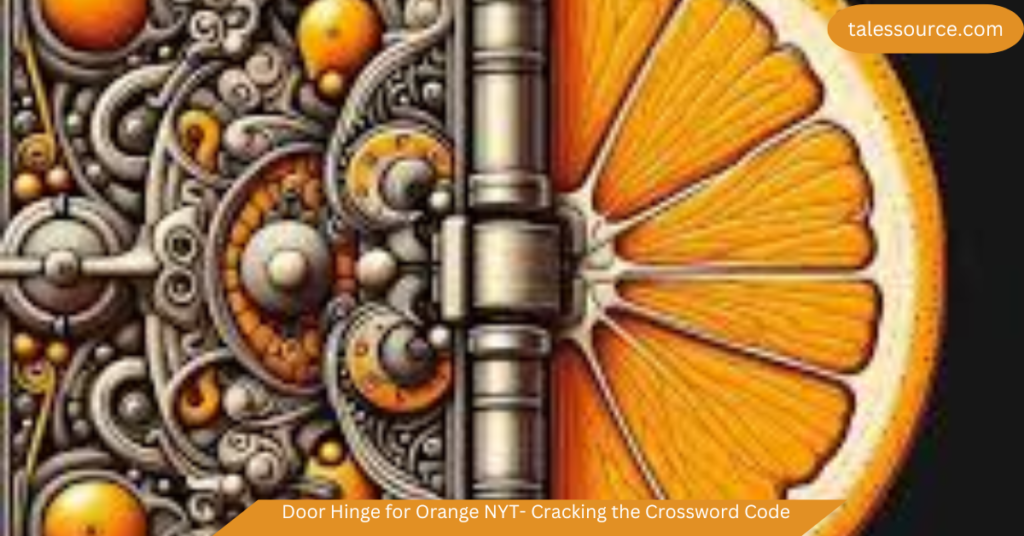Door Hinge for Orange NYT- Cracking the Crossword Code

Introduction:
Crossword puzzles are a beloved pastime for many, combining mental exercise with the satisfaction of solving intricate clues. However, certain phrases can stump even the most experienced solvers. One such perplexing clue is “door hinge for orange NYT,” a phrase that has baffled many New York Times crossword enthusiasts. In this guide, we’ll delve into the meaning behind this cryptic clue, offering insights, strategies, and a deeper understanding of the art of crossword solving.
H1: Understanding the Clue
Breaking Down the Clue:
Wordplay in Crosswords Crossword puzzles often employ wordplay, where the clue might not directly relate to the answer in a straightforward manner. Instead, solvers are required to think outside the box, interpreting the clue in a more abstract or creative way. The phrase ” Door Hinge for Orange NYT” is a prime example of such wordplay, blending phonetics and metaphor to mislead and challenge solvers.
The Role of Phonetics in Crossword Clues
One key aspect of this clue is its reliance on phonetics. In many crossword puzzles, clues are designed to sound like the answer, even if the words themselves don’t match. “Door Hinge for Orange NYT” may seem unrelated at first glance, but when spoken aloud, the words share a similar sound pattern. This phonetic similarity is the key to unlocking the clue.
Analyzing the Phrase
- Door Hinge and Orange: The sound of “door hinge” phonetically resembles the word “orange.” While they don’t share exact letters, the way they are pronounced can lead to a clever play on words.
- NYT and Crossword Style: The New York Times crossword is known for its challenging and creative clues, often incorporating this type of wordplay to engage solvers. Understanding this style is crucial to decoding tricky clues like “door hinge for orange.”
Strategies for Solving Phonetic Clues
Think Aloud
When faced with a clue that doesn’t seem to make sense, try reading it aloud. Often, the sounds of the words will guide you toward the correct answer. In the case of “Door Hinge for Orange NYT,” saying the phrase repeatedly might reveal the phonetic link between the two seemingly unrelated terms.
Use Contextual Clues
Sometimes, the surrounding clues in a crossword can provide hints or confirm your suspicions about a tricky answer. If you’re struggling with “Door Hinge for Orange NYT,” check the intersecting words in the puzzle. They might offer additional letters that can help you zero in on the correct response.
Embrace the Challenge
Crosswords are designed to be challenging, and encountering difficult clues is part of the experience. Instead of getting frustrated, embrace the challenge as an opportunity to improve your solving skills. Each tough clue you conquer, like “Door Hinge for Orange NYT” adds to your repertoire of strategies and knowledge.
Examples of Similar Crossword Clues
Phonetic Clues in Crossword History
- “Four Candles for Fork Handles”: This classic example from British comedy also appears in crossword puzzles, relying on the phonetic similarity between “four candles” and “fork handles.”
- “Lead for Lead”: Depending on pronunciation, “lead” can refer to either a metal or a verb meaning to guide, making it a popular trick in crossword clues.
Thematic Clues
Some crosswords are themed, where all the clues and answers are related to a particular topic. In such puzzles, understanding the theme can provide insight into solving complex clues like “Door Hinge for Orange NYT”
A Themed NYT Crossword
In a themed New York Times crossword, the clue “Door Hinge for Orange NYT” might relate to a broader theme, such as homophones, rhymes, or puns. Recognizing the theme early can help you solve the entire puzzle more efficiently.
Tips for Becoming a Crossword Pro
H2: Practice Regularly
The more you solve crosswords, the better you’ll become at recognizing patterns, understanding wordplay, and thinking creatively. Make crossword puzzles a regular part of your routine to hone your skills.
Learn Common Crossword Words
Crossword puzzles often rely on a set of commonly used words that fit well into grids due to their letter patterns. Familiarize yourself with these words, as they frequently appear in clues and answers.
Join a Crossword Community
Engaging with a community of fellow crossword enthusiasts can provide new insights and strategies. Online forums, social media groups, and local clubs are great places to discuss tricky clues like “door hinge for orange” and learn from others.
Conclusion:
Decoding clues like “door hinge for orange NYT” is no easy feat, but with the right approach, anyone can become a skilled crossword solver. By understanding the intricacies of wordplay, phonetics, and thematic clues, you’ll be better equipped to tackle even the most challenging puzzles. Remember, crosswords are as much about enjoying the journey as they are about finding the correct answers. So, embrace the challenge, keep practicing, and soon, you’ll find yourself cracking clues with ease.
FAQs
What does the clue “door hinge for orange” mean?
- The clue relies on phonetics, where “door hinge” sounds similar to “Door Hinge for Orange NYT” when spoken aloud. This type of wordplay is common in crossword puzzles, especially in the New York Times.
Why are crossword clues sometimes so difficult to understand?
- Crossword clues often use wordplay, puns, or phonetics to challenge solvers. The difficulty is intentional, designed to make the solving process more engaging and rewarding Door Hinge for Orange NYT.
How can I improve my crossword-solving skills?
- Practice regularly, learn common crossword words, and engage with a crossword community. Over time, you’ll become more adept at recognizing patterns and decoding tricky clues Door Hinge for Orange NYT.
Are there any tools to help solve difficult crossword clues?
- Yes, there are several online tools and apps that can assist with solving crossword puzzles. However, relying too heavily on them might reduce the satisfaction of solving the puzzle on your own Door Hinge for Orange NYT.
What are some other examples of phonetic clues?
- Examples include “Four Candles for Fork Handles” and “Lead for Lead,” where the pronunciation of the words plays a crucial role in understanding the clue.
Do all crossword puzzles use wordplay?
- Not all crossword puzzles use wordplay, but it’s a common feature in many high-quality puzzles, particularly those found in the New York Times.
How does the New York Times crossword differ from other crosswords?
- The New York Times crossword is known for its creativity, challenging clues, and high-quality construction. It’s considered one of the most prestigious crosswords in the world.
Can solving crosswords improve my vocabulary?
- Yes, regularly solving crosswords can help expand your vocabulary and improve your language skills, as you’ll encounter a wide range of words and phrases.
What should I do if I’m stuck on a crossword clue?
- Take a break and return to the puzzle later with fresh eyes, try reading the clue aloud, or consider the surrounding clues for additional hints.
Is there a specific strategy for solving NYT crossword puzzles?
- Familiarizing yourself with common NYT themes, practicing regularly, and learning to recognize wordplay are all effective strategies for solving NYT crosswords.





